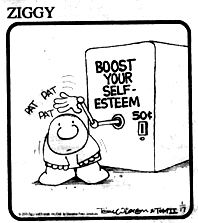 |
| source |
Sandra Murray, a professor at the State University of New York – Buffalo, argues that because individuals with low self-esteem see themselves in such a negative light, they often feel inferior to their relationship partners. Given the discrepancy between their self-views (sucky) and their views of their partner (awesome) they often have a hard time 1) understanding why their partner wants to be with them, and 2) believing that their partner is truly committed to them. Murray calls this a state of “felt insecurity,” and has found that it’s associated with self-protective behaviors that eventually undermine relationship functioning (Murray, Holmes, & Collins, 2006).
To change this process, Murray and colleagues (2005) conducted two interventions that tried to reduce feelings of inferiority by pointing to 1) strengths in the self, and 2) flaws in the partner. She believed that “putting the partner within reach” would alleviate rejection concerns, increase felt security, and by extension boost self-esteem. Here’s what she did…
 |
| source |
In the first study Murray attempted to “put the partner within reach” by increasing the participant’s own positive self-views. Participants completed a bogus personality assessment and were given feedback about their profile. Participants were led to believe that they had a combination of BOTH strengths AND weaknesses that easily fit with many partners and were desired by many people. Participants with low self-esteem responded to the intervention with increased confidence in their partner’s positive regard and long-term commitment to their relationship. In addition, these participants evidenced a boost in self-esteem. Presumably, the intervention alleviated doubts about their interpersonal value, and by extension made them feel like they were on equal footing with their partner after all. Why did feedback increase self-esteem and not backfire like in other studies? The feedback was not over the top. It was believable for participants with low self-esteem, given that it considered both strengths and weaknesses, unlike the “I am lovable” affirmation participants were instructed to complete in the failed positive affirmation intervention.
Boosting Self-Esteem - Study 2
In the second study Murray attempted to “put the partner within reach” by decreasing the participant’s overly positive views of their partner. Participants completed a survey that ostensibly measured how considerate their partner was. The survey included questions like “Have you ever felt your partner was being selfish” or “Has your partner ever done something he or she really hates just to make you happy.” Subsequently, participants received feedback from the experimenter that their partner was not behaving as considerately as he or she could. The findings, although surprising and bizarre, fit with Murray’s hypothesis. After being told that their partner treated them inconsiderately, participants with low self-esteem responded with increased confidence in their partner’s positive regard, and long-term commitment to their relationship. Moreover, learning that their partner treated them inconsiderately led to a small boost in their self-esteem. Like in the first study, Murray argued that the intervention mitigated the discrepancy between the participants’ self-views and their grandiose views of the partner. This made participants feel more confident that their partner wanted to be with them, and by extension, made them feel more confident in themselves.
 |
| source |
1. Self-esteem is hard to change.
Although I presented a few interventions that have been successful, it is notoriously difficult to change self-esteem. Self-views evolve out of a lifetime of experience. A quick manipulation in a psychology study must be extremely well tuned to overcome a history of rejection or failure.
2. No pie in the face.
Bombarding people with positive feedback in complete contradiction to self-views doesn’t seem to work. Telling someone to repeat “I am lovable” when they just don’t feel that way, not only failed to increase self-esteem, but actually reduced it in one lab study.
3. Be real.
Interventions that provide more realistic, albeit still positive, feedback seems to work well. For example, telling participants with low self-esteem that they have a combination of both strengths and weaknesses that are desirable in a partner did boost self-esteem. It was believable and therefore beneficial.
4. Be creative.
As the final Murray study showed us, changes in self-esteem are often counterintuitive. Making participants believe that their partner was inconsiderate actually boosted their self-esteem. They stopped feeling so inferior to the partner, and that made them more secure in themselves. If you’re interested in self-esteem, and are attempting to design an intervention to improve it, try thinking outside the box.
Do you have any ideas how to boost self-esteem or know of other studies that have shown success? Why do you think self-esteem is so hard to change?
The article:
Murray, S., Rose, P., Holmes, J., Derrick, J., Podchaski, E., Bellavia, G., & Griffin, D. (2005). Putting the Partner Within Reach: A Dyadic Perspective on Felt Security in Close Relationships. Journal of Personality and Social Psychology, 88 (2), 327-347 DOI: 10.1037/0022-3514.88.2.327

Nice choice of topic!
ReplyDeleteI admire how you tend to come up with this very informative topic!
ReplyDeleteIt really helps me a lot because in I'm one of those people out there that needs to boost the self-esteem.
I will surely follow this one!
Glad the post was informative and helpful. Keep reading!
ReplyDeleteParents if you are looking for more tools of for Self Esteem for Teens to help your teenagers strengthen their sense of self about Self Esteem for Teens you’ve landed in the right spot. For you I have articles, blog posts, mentoring, workshops, parenting groups, and guided Mother-Daughter Retreats, all of which will help you in your relationship with your Self Esteem for Teens.
ReplyDeleteThis is useful and interesting concept about Online Reputation Management services and usefulness. Strategies is great and is one of the very strong benfits.
ReplyDeleteImproving Self Esteem - Enter the world of building self esteem. Former low self esteem sufferer unlocks the code to getting your best life. Discover the correct keys to a content and happy life